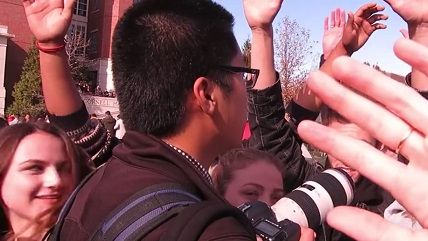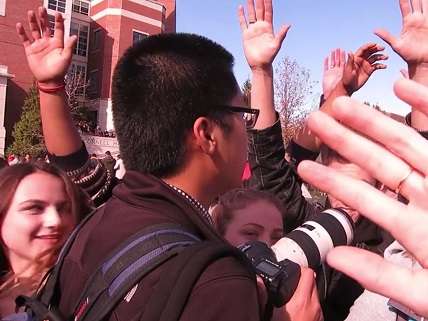Students at Yale, Missouri Beg College Administrators to Play Mommy and Daddy
In loco parentis returns: Yale and Mizzou students want to be treated like kids again


Half a century ago, student activists liberated themselves—partly, at least—from in loco parentis: the paternalistic notion that college administrators should serve as watchful guardians, restricting students' activities and rights in order to provide a safe environment for them, the way a mother or father would. Today, students across the country are determined to undo this liberation.
At Yale University, a group of aggrieved minority students have demanded the resignations of administrators who wisely rejected calls for emotional coddling. Nicholas Christakis, the master of Yale's Silliman College, and his wife, Erika Christakis, an early childhood educator at Yale, conveyed to students that they should make their own decision about what Halloween costumes to wear, avert their eyes if they are offended, and make their own decisions about appropriate dress. Nicholas was subsequently mobbed by students, forced to apologize, and—if students get their way—could lose his job as master of Silliman.
Students at the University of Missouri were even more immediately successful: they forced President Tim Wolfe to resign for being insufficiently attentive to a string of painful incidents—someone yelling a racial slur at the black student government president, the appearance of a swastika on campus, etc. Wolfe's ouster was prompted by a student's hunger strike and the football team's decision to boycott all future games.
Perhaps the most astonishing thing about these students' censorious actions is how profoundly conservative they are. By communicating an expectation that their master or president protect them from unsightly Halloween costumes, or promise them no more hurtful words will be said at their expense, students are essentially calling for a return to campus life under in loco parentis. They reject not merely a free and open campus dialogue, but adulthood itself.
A controversial column in The Yale Daily Herald makes this rejection undeniable:
It's unacceptable when the Master of your college is dismissive of your experiences. The Silliman Master's role is not only to provide intellectual stimulation, but also to make Silliman a safe space that all students can come home to. His responsibility is to make it a place where your experiences are a valid concern to the administration and where you can feel free to talk with them about your pain without worrying that the conversation will turn into an argument every single time. We are supposed to feel encouraged to go to our Master and Associate Master with our concerns and feel that our opinions will be respected and heard.
But, in his ten weeks as a leader of the college, Master Christakis has not fostered this sense of community. He seems to lack the ability, quite frankly, to put aside his opinions long enough to listen to the very real hurt that the community feels. He doesn't get it. And I don't want to debate. I want to talk about my pain.
The writer, Jencey Paz, goes on to make an explicit comparison between the role of the college master in her life and that of her father:
My dad is a really stubborn man. We debate all the time, and I understand the value of hearing differing opinions. But there have been times when I have come to my father crying, when I was emotionally upset, and he heard me regardless of whether or not he agreed with me. He taught me that there is a time for debate, and there is a time for just hearing and acknowledging someone's pain. …
Christakis hasn't checked in on any of us. He hasn't given us any indication that he is going to or wants to heal the community. If you know I'm in pain and you aren't doing anything to try to help me, then how can you be sorry? Christakis is the Master of Silliman College, it is his job to take care of us, and he is failing.
The op-ed is easy to criticize—although it's not okay to criticize it, according to The Herald's editors, who eventually took it down "at the author's request," because it was reaching an audience outside its intended readership (Yale students). The irony of the student newspaper taking this step should be obvious to all: Paz asserted that she didn't want to debate her pain, wrote an op-ed about it, and then withdrew it once people started to do exactly what an op-ed calls for: engage and debate it.
Students at Missouri are similarly unwilling to handle criticism, feedback, or really anything other than validation. In the wake of Wolfe's resignation, reporters flooded the campus, but students formed a human shield around the black activists who had achieved this victory to rescue them from being interviewed.
"You don't have a right to take our photos," said one student to a photojournalist, according to this video taken by another journalist, Mark Schierbecker. (Update: I've embedded the video; you can watch it below.)
Student conduct at Yale has been even more unbelievable. According to The Atlantic's Conor Friedersdorf and The Yale Daily News, student-protesters spat upon people attending a free speech event over the weekend:
These students were offended by one person's words, and were free to offer their own words in turn. That wasn't enough for them, so they spat on different people who listened to those words and called one minority student a traitor to his race. In their muddled ideology, the Yale activists had to destroy the safe space to save it.
It's clear that many of today's students—at Yale, Missouri, and other campuses—don't value free expression the way their radical predecessors did. But the Yale and Missouri incidents reveal something even more startling: they don't value their own independence, either. Their goal is to re-enshrine in loco parentis. They want their administrators-in-chief to hold them while they cry, pat them on the back, and softly whisper into their ears, "you're right, I'm so sorry."
Will these same students, complain, I wonder, if their administrators start sending troublemakers to bed without supper, or preventing them from hanging out with their friends until they finish their homework? Keep in mind that prior to the '60s, administrators placed broad restrictions on students' rights to socialize, organize, and speak. That's what parents do, it's what used to take place on college campuses, and it's what awaits these students who are suddenly so desperate to be treated like children again.


Show Comments (426)